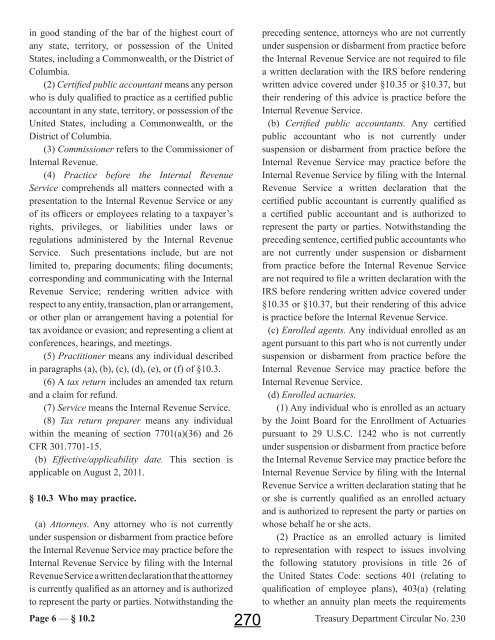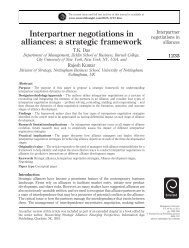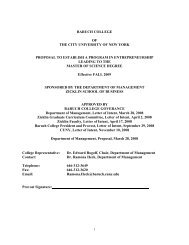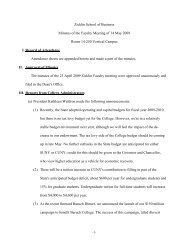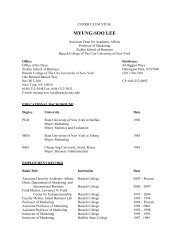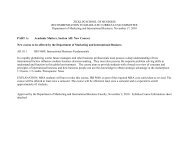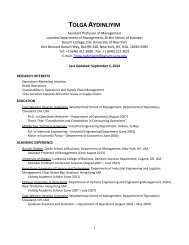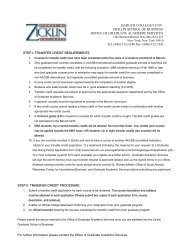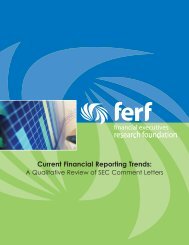Tax Seminar #3 – December 3 2012
Workbook - Zicklin School of Business
Workbook - Zicklin School of Business
You also want an ePaper? Increase the reach of your titles
YUMPU automatically turns print PDFs into web optimized ePapers that Google loves.
in good standing of the bar of the highest court of<br />
any state, territory, or possession of the United<br />
States, including a Commonwealth, or the District of<br />
Columbia.<br />
(2) Certified public accountant means any person<br />
who is duly qualified to practice as a certified public<br />
accountant in any state, territory, or possession of the<br />
United States, including a Commonwealth, or the<br />
District of Columbia.<br />
(3) Commissioner refers to the Commissioner of<br />
Internal Revenue.<br />
(4) Practice before the Internal Revenue<br />
Service comprehends all matters connected with a<br />
presentation to the Internal Revenue Service or any<br />
of its officers or employees relating to a taxpayer’s<br />
rights, privileges, or liabilities under laws or<br />
regulations administered by the Internal Revenue<br />
Service. Such presentations include, but are not<br />
limited to, preparing documents; filing documents;<br />
corresponding and communicating with the Internal<br />
Revenue Service; rendering written advice with<br />
respect to any entity, transaction, plan or arrangement,<br />
or other plan or arrangement having a potential for<br />
tax avoidance or evasion; and representing a client at<br />
conferences, hearings, and meetings.<br />
(5) Practitioner means any individual described<br />
in paragraphs (a), (b), (c), (d), (e), or (f) of §10.3.<br />
(6) A tax return includes an amended tax return<br />
and a claim for refund.<br />
(7) Service means the Internal Revenue Service.<br />
(8) <strong>Tax</strong> return preparer means any individual<br />
within the meaning of section 7701(a)(36) and 26<br />
CFR 301.7701-15.<br />
(b) Effective/applicability date. This section is<br />
applicable on August 2, 2011.<br />
§ 10.3 Who may practice.<br />
(a) Attorneys. Any attorney who is not currently<br />
under suspension or disbarment from practice before<br />
the Internal Revenue Service may practice before the<br />
Internal Revenue Service by filing with the Internal<br />
Revenue Service a written declaration that the attorney<br />
is currently qualified as an attorney and is authorized<br />
to represent the party or parties. Notwithstanding the<br />
Page 6 — § 10.2<br />
270<br />
preceding sentence, attorneys who are not currently<br />
under suspension or disbarment from practice before<br />
the Internal Revenue Service are not required to file<br />
a written declaration with the IRS before rendering<br />
written advice covered under §10.35 or §10.37, but<br />
their rendering of this advice is practice before the<br />
Internal Revenue Service.<br />
(b) Certified public accountants. Any certified<br />
public accountant who is not currently under<br />
suspension or disbarment from practice before the<br />
Internal Revenue Service may practice before the<br />
Internal Revenue Service by filing with the Internal<br />
Revenue Service a written declaration that the<br />
certified public accountant is currently qualified as<br />
a certified public accountant and is authorized to<br />
represent the party or parties. Notwithstanding the<br />
preceding sentence, certified public accountants who<br />
are not currently under suspension or disbarment<br />
from practice before the Internal Revenue Service<br />
are not required to file a written declaration with the<br />
IRS before rendering written advice covered under<br />
§10.35 or §10.37, but their rendering of this advice<br />
is practice before the Internal Revenue Service.<br />
(c) Enrolled agents. Any individual enrolled as an<br />
agent pursuant to this part who is not currently under<br />
suspension or disbarment from practice before the<br />
Internal Revenue Service may practice before the<br />
Internal Revenue Service.<br />
(d) Enrolled actuaries.<br />
(1) Any individual who is enrolled as an actuary<br />
by the Joint Board for the Enrollment of Actuaries<br />
pursuant to 29 U.S.C. 1242 who is not currently<br />
under suspension or disbarment from practice before<br />
the Internal Revenue Service may practice before the<br />
Internal Revenue Service by filing with the Internal<br />
Revenue Service a written declaration stating that he<br />
or she is currently qualified as an enrolled actuary<br />
and is authorized to represent the party or parties on<br />
whose behalf he or she acts.<br />
(2) Practice as an enrolled actuary is limited<br />
to representation with respect to issues involving<br />
the following statutory provisions in title 26 of<br />
the United States Code: sections 401 (relating to<br />
qualification of employee plans), 403(a) (relating<br />
to whether an annuity plan meets the requirements<br />
Treasury Department Circular No. 230


